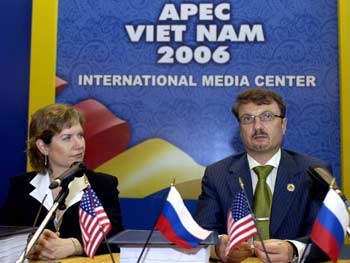
US Trade Representative Susan Schwab (L) and Russian
Minister of Trade and Economic Development German Gref attend a signing ceremony
in Hanoi, capital of Vietnam, Nov. 19, 2006. -Xinhua
Russia and the United States signed in Hanoi Sunday a bilateral
agreement on Russia's accession to the World Trade Organization (WTO) on the
sidelines of the ongoing Asia-Pacific Economic Cooperation (APEC) Economic
Leaders' Meeting.
The agreement, signed by U.S. Trade Representative Susan Schwab and Russian
Minister of Trade and Economic Development German Gref, paved the way for Russia
to become a full member of the WTO.
Describing it as an important milestone in Russia's bid to join the WTO,
Schwab said the document signed will be subject to approval through legal
procedures in their respective countries.
"I'm pleased that we have concluded this important agreement with Russia's
WTO accession negotiations. This is a strong and far-reaching agreement that
meets the high standards of President Bush's market-opening trade agenda and
moves Russia closer to full integration into the global, rules-based trading
system," Schwab said.
She said that the United States will grant permanent normal trade relations
(PNTR) to Russia, and U.S. business people will benefit much once Russia becomes
a full WTO member.
Russian Trade Minister Gref said "The signing of the agreement is a historic
event and a milestone for Russia to integrate into the global economy," adding
that tremendous work had been done by both sides to conclude the agreement.
According to Schwab, Russia's tariff commitments include participation in the
Information Technology Agreement, which will result in the duty-free entry of IT
products such as computers and semiconductors.
Russia has also agreed to substantially reduce its tariffs on both wide body
and narrow body of civil aircraft and parts, and the country's overall bound
tariff rate on industrial and consumer products will average around eight
percent.
With respect to other non-tariff barriers, the agreement sets out an
understanding on procedures for importing technology products with encryption.
And Russia will reduce export duties on ferrous (steel) scrape and eliminate its
export duty on copper cathode.
The bilateral market access agreement also includes important provisions that
will strengthen intellectual property rights (IPR) protection in Russia.
Gref said that Russia had been committed to IPR protection, which is in the
interest of the country, adding that Russia will implement what has been agreed
in the document.
Russia has been negotiating its terms of accession to the WTO, and previously
the General Agreement on Tariffs and Trade, since 1993. The next step in
Russia's accession process is completion of multilateral negotiations.
"I am pleased to work with the Russian side on the last stage of the
journey," Schwab said.



